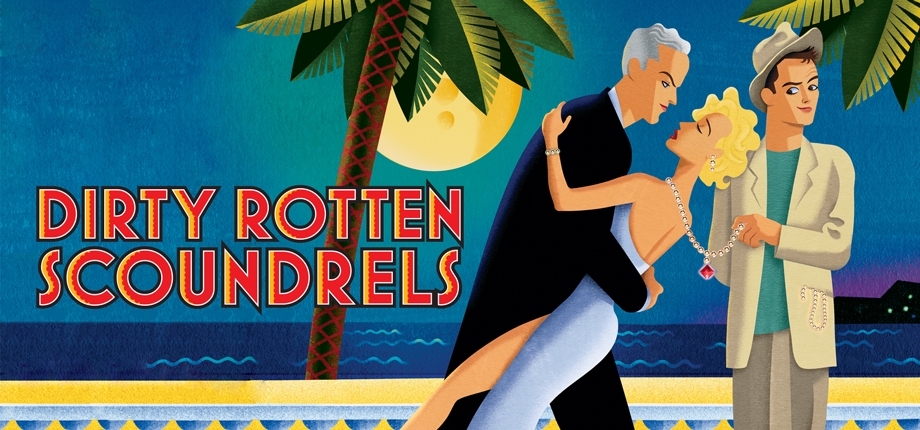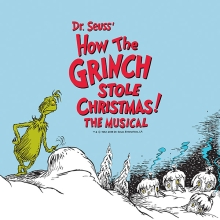Filichia Features: Scoundrels Who Aren't Rotten to the Score

Filichia Features: Scoundrels Who Aren't Rotten to the Score
Do you know how David Yazbek concluded his 2005 Playbill bio for Dirty Rotten Scoundrels?
After he'd listed his Drama Desk Award-winning and Tony-nominated score for The Full Monty, detailed his pop achievements and added his Emmy for his work with David Letterman, you'll never guess what Yazbek wrote.
"David is seven."
Well, very few of us haven't lied about our ages. He apparently felt as if he were seven.
If he had been that age back then, he would then have given us an additional three decades' worth of ultra-impressive scores.
And now Mr. Yazbek is offering Broadway his most mature work: The Band's Visit.
To be sure, it offers plenty of joy, but it's easily the most serious of Yazbek's four Broadway scores. The can't-get-a-ticket hit is currently the odds-on favorite to win the Tony as Best Musical and a Best Score prize for Yazbek.
While you're waiting for the rights to present it, do consider Mr. Yazbek's Tony-nominated Dirty Rotten Scoundrels.
Have you two leading men who've acted together so often that they've become a veritable team that your audiences relish seeing? They've wowed everyone with their Max and Leo in The Producers and their Frank and Carl in Catch Me If You Can. Now let your two stars play a couple of other definitive rogues: Lawrence Jamieson and Freddy Benson, two men cut from very different bolts of cloth but both Dirty Rotten Scoundrels.
Yazbek created a nice suave melody to introduce Lawrence, the elegant reprobate who bilks high-toned society women in the French Riviera. In contrast, Yazbek gave a most ugly melody to acquaint us with Freddy - for he's a pretty crude petty thief.
And yet, when Christine Colgate arrives for a vacation, Freddy is the one to sing the more beautiful song to her. "Nothing Is Too Wonderful to Be True." Any song that begins with the minty-fresh image "Look at the way the moon behaves" immediately deserves respect.
When you've got a nifty surprise ending enjoyed in the film version - and Scoundrels certainly does - you don't mess with it. More to the point, if midway through the show you start thinking that Christine must be awfully stupid to be taken in by these guys, by show's end you'll have more respect for her.
That Yazbek is natively theatrical is remarkable considering that he didn't set out to write for Broadway; he simply fell into it when Adam Guettel decided that he didn't want to provide the score for The Full Monty but said he knew the right man for the job.
Did he ever.
True to his background, however, Yazbek's songs sound more pop-oriented than we have in the average classic theater score. Who'd expect that a song called "Chimp in a Suit" would be a jazz waltz? Or that one titled "Here I Am" would be a bossa nova? Almost every song starts with a vamp so enticing that it immediately pricks up your ears and compels you to pay attention to what's coming.
When Promises, Promises opened in 1968, critic Martin Gottfried said that not only were Hal David's lyrics funny, but Burt Bacharach's music somehow managed to be as well. That's true here, too, right from the Overture.
The lyrics are chock-full of jokes, too. "All about Ruprecht" is Yazbek at his most lyrically audacious. His intelligence, too, is shown by his building a song upon "The Corpus Hippocraticum."
There are great roles for actresses as well. In addition to Christine, there's Muriel Eubanks, who has her heart set on Lawrence but will settle for his assistant Andre. Jolene Oakes, another Lawrence admirer, sings the pleasures of her home state, but not for the first time in Broadway history: "Oklahoma?" is the name of the song -- and yes, it uses a question mark at the end instead of the familiar exclamation point.
Frankly, every David Yazbek song in Dirty Rotten Scoundrels is so exciting that they deserve exclamation points of their own. Give your performers a chance to sing them.
You may e-mail Peter at pfilichia@aol.com. Check out his weekly column each Monday at www.broadwayselect.comand Tuesday at www.masterworksbroadway.com . His book, The Great Parade: Broadway's Astonishing, Never-To-Be Forgotten 1963-1964 Season is now available at www.amazon.com.

























